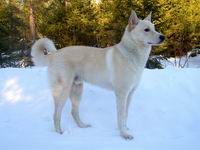
Canaan Dog
Veterinarian Reviewed on December 22, 2007 by Dr. Janice Huntingford
Physical Characteristics
Breed Group:
Pariah Dog
Weight:
These medium sized dogs are around 37 to 57 pounds (16 – 25 kg).
Height:
Canaan Dogs stand 19 – 24 inches, or 48 – 61 cm tall.
Color(s):
Canaan Dogs come in black, cream, and various shades of brown and red in between. White and white with patches of these colors are also possible.
Coat:
Canaan Dogs are double coated. The outer coat is of short to medium length.
Overview
Character:
Canaan Dogs retain many of the qualities of their ancestors who roamed free in the desert. They can be aloof and independent, but are also quick learners that form deep bonds with their owners. Because of their natural wariness of strangers, they make excellent guard dogs. Their primitive, rustic origin makes them one of the most intelligent and resilient dog breeds, having survived in the harsh wilderness for centuries
Country of Origin:
Israel/Palestinian Territories
History:
Canaan Dogs are of an ancient breed in the Middle East. They may have been guards and herding dogs of the ancient Hebrews, and after the Romans took over this region they remained as half-feral scavengers that lived close to human settlements. Selectively breeding Canaan dogs as a specific breed as guard dogs and pets began quite recently, and they were first introduced to America in 1965. The breed was finally officially recognized by the American Kennel Club in 1989, and remains relatively rare in the new world. The Canaan Dog is the national dog of Israel.
Name:
Canaan, the ancient name of modern-day Israel and the Palestinian Territories, is where this ancient breed was first discovered and domesticated. The name not only represents their geographic origin, but also their long history that is believed to date back to the biblical times.
Temperament:
They possess many “wild” characteristics, including being independent, not eager to please, and easily bored with repetitive tasks. They can also be territorial and very defensive; as such, they should be socialized early on, especially around children, although they do become gentle and loving after they become familiar with the people around them. Once they are bonded with their families they can be fiercely devoted, since they are guardians by nature.
Care
Training:
Canaan Dogs are intelligent and would welcome a variety of stimuli, as they become bored with repetition. Positive reinforcement tends to work well with this independent breed. It is important to keep training sessions short and with lots of rewards, so that they do not associate training with any negative experience. Since they display herding and tracking instincts, exercises that mimic these activities are especially desirable. With correct training applied, Canaan Dogs are quick learners, and can perform a variety of tasks that make them excellent companions as well as working dogs.
Activity:
While they are generally docile and would not mind relaxing indoors, they do need daily walks and the occasional sprint.
Ownership:
Canaan Dogs are devoted, loving companions that will form long-lasting bonds with their families. Since they do not require excessive amount of exercise, it is possible for them to be apartment pets; although they are eager to alert their owners of any disturbance in the environment, so they do have a tendency to bark. If barking becomes a problem it can be minimized through training, and also by removing the stress from their environment.
Breeders
No breeders listed at this time.
Sign up for our newsletter and receive more articles and the latest pet health updates and special offers.
Our Expert
 Dr. Janice Huntingford
Dr. Janice HuntingfordJanice Huntingford, DVM, has been in veterinary practice for over 30 years and has founded two veterinary clinics since receiving her Doctor of Veterinary Medicine at the Ontario Veterinary College, University of Guelph. She has studied extensively in both conventional and holistic modalities. Ask Dr. Jan

